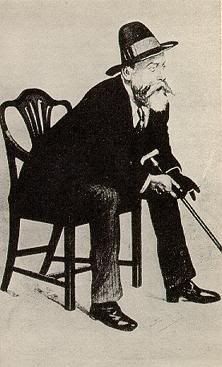Quote:
Originally Posted by Hookbill the Goomba

A thought struck me.
While writing an essay on the Bombadil poem for university, I had to try and make some sort of interpretation of the character based on his actions. I was quite worried about this, seeing as any interpretation of Bombadil is bound to come up against opposition from a hundred other Tolkien fans. 
But this thing struck me as a useful way of looking at him. Here is what I said...
Quote:
|
Originally Posted by Hook's paper
The voice in the Bombadil poem is almost childish; it is very playful and rarely threatening. Even though some of the images are quite horrific; a tree that eats people and the ghostly Barrow Wight could well be terror inducing if allowed their share of description and development (which, by-the-by they get in The Lord of the Rings).
However, Tom seems to be able to deal with these horrors quite easily. His songs appear to have a certain power over them and even the badgers submit to his will when he sings. The picture we are left with is one of a very unusual character who, no matter what terrors await him, is able to deal with them calmly and efficiently. The lessons in this poem (I do not think they are the point of the poem at large, however) point towards a life where the horrors do not own people. The ending of the poem emphasises Tom’s attitude to life;
Old Tom Bombadil heeded not the voices,
Taps, knocks, dancing feet, all the nightly noises;
Slept till the sun arose, then sang like a starling:
‘Hey! Come derry-dol, merry-dol, my darling!’
Sitting on the door-step chopping sticks of willow,
While fair Goldberry combed her tresses yellow.
The impression we get of Bombadil’s home life is one of complete freedom, not enthralled by the terrors of the forest and even taking a previously threatening water spirit for his wife. The playful words of his nonsensical song empress upon us how startlingly strange he is. When we live in a world where the horrors (in Tolkien’s day, it may have been the threat of Hitler’s Germany) are broadcast to us daily, Tom’s attitude seems singularly unnerving. What some have dubbed the ‘childish innocence’ of the poem plays on this, exposing the fears as unimportant in the grand scheme of things. Not that Tom does not deal with the problems, but rather, does not let them dominate his life.
|
Now, with regards to this chapter in the book I think this still applies. Bombadil has this 'detached' attitude, the dangers of the wood don't scare him, nor do the Barrow Wights (we'll have to work harder, folks  ). Whatever Tom is, his attitude is rather startling, isn't it? The only thing that worries him is damaging the water lilies, seemingly.
Any thoughts? |
Well now,
Hookbill, you've got me thinking of a whole new angle to our perennial question "Who or What is Tom Bombadil?" (btw, do you have any idea how easy it is and how many ways there are to mispell that name? Wait, I suspect you might.)
It's your bit about not being "owned" by terrors and trouble and tribulations that got me thinking about this concept of manhood. It's quite a feature in the literature just before Tolkien's time and there are two examples of it that are well known indeed. (As an aside, they garner just about as much ridicule and parody as Tolkien's Tom does.)
Quote:
|
Originally Posted by [URL="http://en.wikipedia.org/wiki/Invictus"
Invictus[/URL]]
It matters not how strait the gate,
How charged with punishments the scroll,
I am the master of my fate:
I am the captain of my soul.
|
This is just the last stanza that stands out so much to me. Why, Goldberry could verily have taken her words to Frodo about Tom from this stanza!
And just as yet another aside (of which this post seems to have many) here is a photograph of the author of
Invictus, William Ernest Henley. Even granted that many late Victorian gentlemen were rather bushy-faced, his resemblance to many painters' depictions of Bombadil could well be one of those happy happenstances of cultural serendipity.

It must have been rather difficult to see the stiff upper lip under all that beard, but we must remember that not all expositors on this ideal of manhood wore full beards. I believe that Kipling, for one, sported only a remarkable mustache. And speaking of Kipling of course there is his remarkable expression of he who is not owned by anything. Note how the reward which Kipling suggests is the very power which Bombadil holds.
Quote:
|
Originally Posted by [URL="http://www.kipling.org.uk/poems_if.htm"
If[/URL]]
Yours is the Earth and everything that's in it,
And - which is more - you'll be a Man, my son!
|
And isn't it just the thing for our four young hobbits at the start of all their adventuring to find a role model for stoic manly virtues? No wonder their post-prandial smokes and talks with Tom in the absence of Goldberry is so important!!
Yes, I think you've hit upon something here,
Hookbill, and I don't think it's rock you've stubbed your toe on.